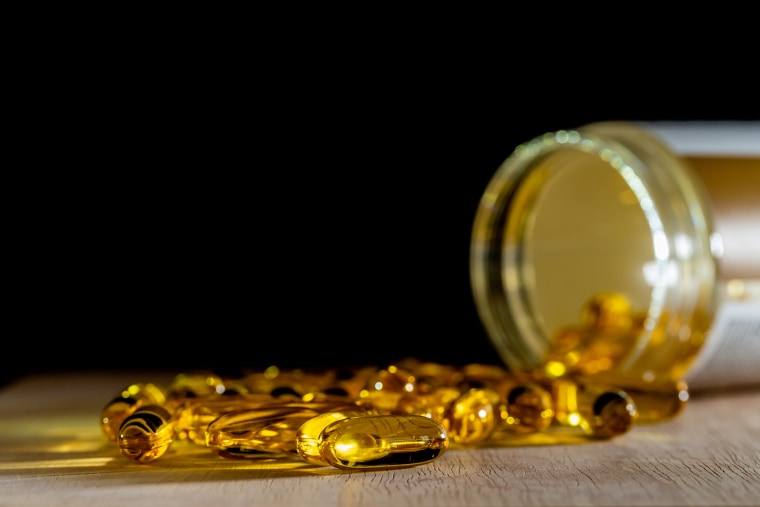By Kaitlin SullivanNBC
News
Vitamin D supplements are recommended to prevent bone fractures in older adults, but a clinical trial, published Wednesday in the New England Journal of Medicine, found that they are not as effective.
In 2011, the National Academy of Medicine (then called the Institute of Medicine) recommended that the general population get between 600 and 800 international units (IU) of vitamin D per day.
[Millions of people still lose their senses of smell and taste after contracting COVID-19]
That recommendation was based on earlier research showing that the vitamin may promote bone health by aiding calcium absorption and slowing bone turnover, which causes bone deterioration.
Subsequent studies have yielded conflicting results.
Some concluded that vitamin D supplementation was beneficial, while another even found that elevated vitamin D levels caused by supplementation could be harmful and lead to more falls.
Other trials have looked at calcium and vitamin D together, making it difficult to look at the effects of the vitamin on its own.
They warn about the dangers of trying on swimsuits in stores
July 21, 202202:55
That was the goal of the new randomized clinical trial to determine whether the addition of vitamin D alone would proactively improve bone health in men 50 and older and women 55 and older.
The results?
For healthy people, "more is not better," said the study's lead author, Dr. Meryl S. LeBoff, director of the Center for Bone Health and Osteoporosis at Brigham and Women's Hospital in Boston.
[Why are there people who have not gotten sick with COVID-19? The BA.5 variant could break that luck]
The clinical trial involved nearly 26,000 adults who were followed for five years.
Women made up half of the participants, black people 20%, and the median age was about 67.
The vast majority had healthy levels of vitamin D: only 2.4% had levels below 12 nanograms per milliliter, which is considered a serious deficiency.
(The normal range for vitamin D is between 20 and 50 nanograms per milliliter, although LeBoff points out that these limits are arbitrary and that each individual is different.)
To see if vitamin D supplementation would reduce the risk of fractures - an important measure of bone health - the researchers compared the number of fractures that occurred over the five years of the study in people who took 2,000 IU of supplemental vitamin D3 with the number of fractures in people who did not take the supplement.
Vitamin D3 is a form of vitamin that is easier for the body to use.
It is produced naturally from sunlight or can come from animal sources.
Another form of the vitamin, vitamin D2, is less easily absorbed by the body.
[Altered results detected in the most influential article on the cause of Alzheimer's]
Although the study didn't look at the combined effects of vitamin D and calcium, participants in the supplement group were able to take in 1,200 milligrams of calcium a day, which is about the recommended daily amount.
This would allow them to get a healthy amount of the mineral, but avoid taking so much that it could have an effect on the results.
(A key function of vitamin D in the body is to facilitate the absorption of calcium.)
Vitamin D capsules.gun75 / Getty Images/iStockphoto
In healthy people who were not severely deficient, vitamin D supplementation made no difference in protection against fractures.
"The bottom line is that, in general, people shouldn't be taking vitamins left and right, and when it comes to preventing fractures, vitamin D alone is not enough," said Dr. Ethel Siris, an endocrinologist who works with osteoporosis patients at Columbia University Medical Center in New York.
She did not participate in the trial.
[Know the benefits of ice water baths]
According to Connie Weaver, Distinguished Research Professor of Nutritional Sciences at San Diego State University, most people get enough vitamin D from the sun and from their diet: fortified milk and juices are common sources of vitamin D in the US diet, and oily fish, such as salmon and trout, are good natural sources of this vitamin.
Supplements aren't necessary for most people and don't seem to provide additional benefits for your bones.
"In the context of fracture reduction, supplementation won't do much for most people," said Weaver, who was not involved in the new research.
LeBoff noted that the findings do not apply to people who have severe vitamin D deficiency, low bone mass or osteoporosis.
Supplements do make a difference in these cases, but even so, they do not act alone.
According to Siris, people at high risk of fractures or with deficiencies need additional doses of both vitamin D and calcium.
People with osteoporosis or low bone density may also need medication.
In addition, exercise to strengthen bones is an important part of preventing falls.
"Just giving people vitamin D does not prevent fractures," he concluded.
"But adequate intake of calcium and vitamin D, in my opinion, is still a necessary part of treating people with osteoporosis," she added.













